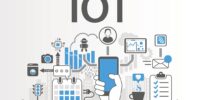Can IoT Improve Energy Efficiency and Sustainability
Are you curious about how IoT can enhance energy efficiency and sustainability?
In this article, we will explore the role of IoT in conserving energy and how it can provide sustainable solutions.
Discover how IoT-enabled smart grids can improve energy efficiency and optimize consumption in buildings.
Additionally, we will delve into the potential of IoT in promoting renewable energy sources.
Join us as we explore the exciting possibilities of IoT in creating a more sustainable future.
Key Takeaways
- Real-time data tracking and monitoring of energy usage enables identification of inefficiencies and areas where energy is being wasted.
- Implementation of IoT strategies can lead to optimized energy consumption management, reduced fuel consumption, lower carbon emissions, and revolutionize transportation for sustainability.
- IoT-enabled smart grids provide enhanced management and optimization of energy distribution, real-time insights into energy consumption, and informed decisions to reduce waste and improve efficiency, resulting in cost savings and sustainability.
- IoT has the potential to promote renewable energy sources by connecting them to the grid, enabling clean transportation, efficient and sustainable energy production, and IoT-driven energy management in agriculture for conservation of water, reduction of wastage, and increased crop yields.
The Role of IoT in Energy Conservation
You can use IoT to monitor and control energy consumption, helping you conserve energy and promote sustainability.
IoT applications in energy monitoring allow you to track and analyze energy usage in real-time. With the help of IoT-enabled energy management systems, you can remotely control and optimize energy consumption in your home or office.
These systems use sensors and smart devices to collect data on energy usage, identify inefficiencies, and suggest improvements. For example, smart thermostats can learn your preferences and adjust the temperature accordingly, reducing energy waste.
IoT also enables the integration of renewable energy sources, such as solar panels, into the grid. By monitoring energy production and consumption, you can make informed decisions to reduce your carbon footprint and contribute to a more sustainable future.
Harnessing IoT Technology for Sustainable Energy Solutions
By harnessing IoT technology, you can create more sustainable energy solutions. The Internet of Things (IoT) has revolutionized the way we monitor and manage energy consumption. With IoT for energy monitoring, you can track and analyze real-time data on energy usage, allowing for more efficient energy management and conservation. Additionally, IoT has greatly impacted transportation systems, playing a vital role in reducing carbon emissions and promoting sustainability. Through IoT in transportation systems, vehicles can be equipped with sensors and connected to smart grids, optimizing routes and reducing fuel consumption. This not only improves energy efficiency but also contributes to a cleaner and greener environment. With IoT, you have the power to make a significant impact on creating a more sustainable future.
| IoT for Energy Monitoring | IoT in Transportation Systems |
|---|---|
| Real-time data tracking | Optimized routes |
| Energy management | Reduced fuel consumption |
| Conservation | Lower carbon emissions |
IoT-Enabled Smart Grids for Improved Energy Efficiency
With IoT-enabled smart grids, you can enhance the management and optimization of energy distribution. By integrating smart devices for energy monitoring, you gain real-time insights into your energy consumption. This allows you to make informed decisions that reduce waste and improve efficiency.
This not only saves you money but also contributes to a more sustainable future. Furthermore, IoT technology extends beyond energy grids and can revolutionize transportation for reduced carbon emissions. Connected vehicles and smart traffic management systems enable efficient route planning, reducing congestion and emissions.
This means cleaner air for you and future generations. Embrace IoT-enabled smart grids and transportation solutions to take control of your energy consumption, reduce your carbon footprint, and contribute to a greener world.
Leveraging IoT to Optimize Energy Consumption in Buildings
Leveraging IoT technology in buildings allows for optimal energy consumption management. With building automation systems and energy monitoring devices connected to the Internet of Things (IoT), you can take control of your energy usage and make more sustainable choices.
By utilizing IoT-enabled devices, you can actively monitor and manage energy consumption in real-time. These smart devices can track and analyze data on electricity, heating, ventilation, and air conditioning (HVAC), lighting, and more. By collecting and analyzing this data, you can identify areas where energy is being wasted and implement strategies to reduce energy consumption.
Whether it’s adjusting temperature settings, turning off lights in unoccupied rooms, or optimizing equipment usage, IoT technology allows you to make informed decisions that can significantly reduce your building’s energy footprint.
Take advantage of IoT technology to optimize energy consumption and contribute to a more sustainable future.
The Potential of IoT in Promoting Renewable Energy Sources
The potential of IoT lies in its ability to connect renewable energy sources to the grid, allowing for more efficient and sustainable energy production. With the help of IoT, clean transportation can be enabled, reducing carbon emissions and promoting a healthier environment. Imagine a world where vehicles are seamlessly connected, optimizing their routes, reducing traffic congestion, and minimizing fuel consumption. IoT can make this a reality, not only improving the efficiency of transportation but also reducing our dependence on fossil fuels.
Furthermore, IoT-driven energy management in agriculture holds immense promise. By using IoT sensors and devices, farmers can monitor and optimize their energy usage, leading to more sustainable farming practices. This technology can help conserve water, reduce wastage, and increase crop yields. Picture a farmer who can remotely control irrigation systems, monitor soil moisture levels, and adjust energy usage accordingly. This not only benefits the environment but also improves productivity and profitability for farmers.
Frequently Asked Questions
What Are the Potential Risks or Drawbacks Associated With Implementing Iot Technology for Energy Conservation?
There are potential risks and drawbacks associated with implementing IoT technology for energy conservation. It is important to consider security vulnerabilities, data privacy concerns, and the need for reliable connectivity.
How Does Iot Technology Contribute to Reducing Carbon Emissions and Addressing Climate Change?
IoT technology for smart homes and industrial energy management solutions can contribute to reducing carbon emissions and addressing climate change. It enables efficient energy usage and monitoring, helping to achieve greater sustainability.
Can Iot Systems Accurately Measure and Monitor Energy Consumption in Real-Time?
Yes, IoT systems can accurately measure and monitor energy consumption in real-time. By utilizing smart meters and energy monitoring devices, IoT enables you to track and analyze your energy usage more efficiently.
What Are Some of the Challenges in Integrating Iot Technology Into Existing Energy Infrastructure?
Integrating IoT technology into existing energy infrastructure can present challenges. You may face compatibility issues, security concerns, and the need for additional training and resources. However, these challenges can be overcome with careful planning and implementation.
How Does Iot Technology Facilitate the Integration of Renewable Energy Sources Into the Energy Grid?
IoT technology facilitates the integration of renewable energy sources into the energy grid by addressing integration challenges and optimizing renewable energy. It helps monitor and manage energy production, distribution, and consumption efficiently.






